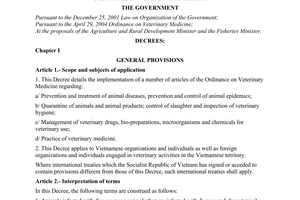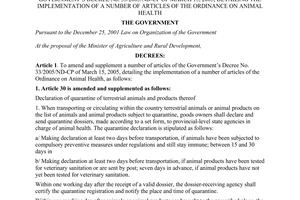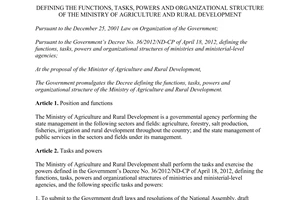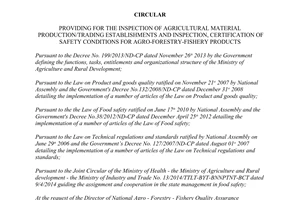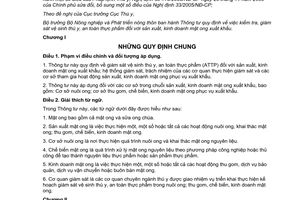Nội dung toàn văn Circular No. 08/2015/TT-BNNPTNT supervision veterinary hygiene food safety exported honey
|
THE MINISTRY OF
AGRICULTURE AND RURAL DEVELOPMENT |
SOCIALIST
REPUBLIC OF VIETNAM |
|
Hanoi, March 02, 2015 |
CIRCULAR
PROVIDING FOR THE INSPECTION AND SUPERVISION OF VETERINARY HYGIENE, FOOD SAFETY FOR PRODUCTION, TRADING OF EXPORTED HONEY
Pursuant to Ordinance on Veterinary medicine dated April 29, 2004;
Pursuant to the Government’s Decree No. 199/2013/NĐ-CP dated November 26, 2013 defining the functions, tasks, entitlements and organizational structure of the Ministry of Agriculture and Rural development;
Pursuant to the Government's Decree No. 33/2005/NĐ-CP dated March 15, 2005 on guidelines for the Ordinance on Veterinary Medicine; the Government's Decree No. 119/2008/NĐ-CP dated November 28th 2008, amending and supplementing the Government's Decree No. 33/2005/NĐ-GOVERNMENT;
At the request of the Director of Department of Animal Health,
The Minister of Agriculture and Rural development promulgates the Circular providing for the inspection and supervision of veterinary hygiene, food safety for production, trading of exported honey
Chapter I
GENERAL PROVISIONS
Article 1. Governing scope and regulated entities.
1. This Circular provides for inspection of veterinary hygiene, food safety for production, trading exported honey; supervision system, responsibilities of supervisory authorities and establishments engaged in production and trading of exported honey.
2. This Circular applies to the establishments of the production, trading chain of exported honey including: beekeeping establishments; establishments of collecting, processing, and trading of exported honey.
Article 2. Interpretation of terms
In this Circular, the following terms are construed as follows:
1. Honey includes honey and royal jelly.
2. Production of honey includes one, several or all of the activities of beekeeping, honey extraction; collecting, processing, and trading honey.
3. Beekeeping establishment is the place where the beekeeping and honey extraction is conducted.
4. Processing of honey means the process in which raw honey is processed by industrial method or manually in order to produce food ingredients or food products.
5. Trading honey includes one, several or all of the activities of collection, preservation, transport, or trading of honey.
6. Supervisory authorities are specialized ones assigned to implement the plan for supervising the veterinary hygiene, food safety in beekeeping; collecting, processing, and trading honey.
Chapter II
INSEPCTION AND SUPERVISION OF VETERINARY HYGIENE, FOOD SAFETY
Article 3. Formulation and approval of supervision plan.
1. The basis of formulation of annual supervision plan:
a) Production of exported honey in the year; Season of honey extraction and processing, and expected production for the following year;
b) Last year’s result of veterinary hygiene, food safety supervision with regard to honey production and trading, warning about quality and food safety of exported honey to determine items of high risk on food safety of competent State agencies.
c) Number of establishments producing and/or trading honey and result of inspection, assessment, and classification of conditions of veterinary hygiene, food safety corresponding to entities mentioned in Article 2 of this Circular.
2. The Department of Animal Health shall take charge to formulate the annual plan for supervision and request the Ministry of Agriculture and Rural development for approval, funding, and implementation.
3. Related agencies, units shall formulate the annual plan sent to importing countries, supervise the number of samples, process the samples, report annual results to the importing countries.
4. Contents of the supervision plan:
a) Inspection and assessment of conditions on veterinary hygiene and sampling of honey at beekeeping establishments; establishments of collecting, processing, and trading honey;
b) Sampling of honey at beekeeping establishments; establishments of collecting, processing, and trading honey;
c) Analysis of residues in honey taken at beekeeping establishments; establishments collecting, processing, and trading honey;
d) Consolidation of reports on the supervision plan at the request of management and of importing countries.
Article 4. Supervisory authorities.
1. The system of inspection and supervision of veterinary hygiene, food safety in beekeeping; collecting, processing, and trading honey includes:
a) Department of Animal Health ;
b) Regional Veterinary Authorities;
c) Center for Veterinary Hygiene Inspection I, II ;
d) Sub- Department of Animal Health of provinces having beekeeping establishments.
2. The supervisory authorities , within the ambit of their tasks and powers, shall perform assigned tasks in order to ensure a closed supervision system of production, transportation, processing, and export.
Article 5. Entities subject to inspection, supervision of production and processing of honey
Beekeeping establishments; establishments collecting, processing, and trading honey shall inspected, supervised by, and must comply with requests of supervisory authorities.
Article 6. Time of inspection, supervision, and sampling.
1. From February to April and from August to October every year, the Department of Animal Health shall inspect, assess, and classify veterinary hygiene, food safety and take samples in order to supervise toxic residues in beekeeping establishments; establishments of collecting, processing, and trading honey.
In case of necessity, establishments shall be inspected and samples of honey shall be taken without prior notice.
2. Inspection, assessment, and classification of veterinary sanitation, safe food for beekeeping establishments; establishments of collecting, processing, and trading honey shall comply with the provisions of Article 7 of this Circular.
3. Samples shall be taken randomly or intentionally in order to supervise and assess the conformity with National technical regulation, regulations on food safety of honey, and requirements of the importing countries (under the guidance in Appendix 1 enclosed with this Circular); sample structure, number of samples taken to analyze residues under the annual plan.
4. The area to take samples of honey shall selected as follows
a) The area where samples of honey in beekeeping establishments are taken shall base on the season and the extraction area of honey;
b) The area where samples of honey in establishments of collection, processing, and trading are taken shall base on the time of inspection, supervision and centralize in the provinces where the establishments collecting and/or processing honey are located.
5. Requirements for samplers.
a) Samplers must be trained in sampling techniques and assigned to take samples by competent agencies.
b) Samplers must be provided adequately with necessary devices and equipment serving the sampling, sample preservation.
Article 7. Inspection, assessment, and classification of conditions on veterinary hygiene, food safety for beekeeping establishments, processing establishments of exported honey.
1. The assessment and classification of beekeeping establishments; establishments of pre-processing, processing exported honey shall comply with the Ministry of Agriculture and Rural development’s Circular No. 45/2014 / TT-BNN dated March 12, 2014.
2. Record on inspection, assessment, and classification of veterinary hygiene, food safety for beekeeping establishments shall use the form in Appendix 2 enclosed with this Circular;
3. Record on inspection, assessment, and classification of veterinary hygiene, food safety for establishments of pre-processing, processing of honey shall use the form in Appendix 3 enclosed with this Circular;
4. Based on the result of inspection, assessment, and classification of veterinary hygiene, food safety, the Department of Animal Health shall grant or revoke the certificate of veterinary hygiene, food safety for establishments processing and/or trading exported honey.
Article 8. Regulations on the inspection, sampling, and analysis of samples.
1. Center for Veterinary Hygiene Inspection I shall take charge and cooperate with Regional Veterinary Authorities and Center for Veterinary Hygiene Inspection II to inspect, take samples and analyze samples for beekeeping establishments, establishments of collecting, processing, and trading honey.
2. Honey must be tested for residues such as antibiotics, heavy metals, plant protection chemicals and other residues according to the approved annual plan.
Within 20 working days from receipt of the sample, the laboratory must notify the results to the supervisory authority to aggregate the analysis results.
3. Sample analysis results shall be retained by the analyzing agency and sent to the relevant authorities.
Article 9. Regulations on quarantine of shipments of exported honey.
1. Only the establishments producing and/or tranding honey that participate in veterinary hygiene, food safety supervision program and are issued with the certificate of eligible for veterinary hygiene shall be allowed to export honey.
2. Quanrantine of exported honey shall be carried out at the request of the importing countries.
3. When detecting the shipments that contain residues exceeding the permitted limits, the agency in charge of quarantine of exported animals shall immediately notify the honey producer or trader and implement necessary measures as prescribed.
Chapter III
USE OF VETERINARY MEDICINES AND FEED IN BEEKEEPING
Article 10. Use of veterinary medicines in beekeeping
1. Only veterinary medicines permitted for sale in Vietnam may be used to prevent and treat diseases in bees as prescribed.
2. When medicines are used to prevent and treat diseases in bees, indications on the labels and instructions of the manufacturers or veterinary officers must be complied with. Beekeeping establishments must have logbooks to monitor the diseases, treatment and use of medicines for bees.
3. In addition to implementing the provisions of the law on the use of veterinary medicines and food in beekeeping, beekeeping organizations and individuals must comply with the requirements of importing countries.
Article 11. Use of food in beekeeping.
Only food used for beekeeping and permitted for sale in Vietnam which has adequate information labels as prescribed is used. It is strictly prohibited to mix antibiotics, hormones and other harmful chemicals in bee food.
Chapter IV
ACTIONS AGAINST VIOLATIONS
Article 12. Actions against unsatisfactory honey during inspection and supervision.
In the process of analyzing samples of honey, if detecting that the veterinary hygiene, food safety required to inspect exceeds the allowed limit, supervisory authorities assigned to handle violations shall:
1. Immediately notify the establishment of which honey was found violations of sanitary veterinary and food safety; the following information must be included in the notification:
a) Name of establishment of which product is detected violation;
b) Reasons of violation;
c) Shipment, the number of products detected violation;
d) Date of sampling and inspection results.
c) Request the establishment for not using raw material for honey in processing or suspension of the export of shipments of honey detected violation.
2. Take samples for reinspection of items detected violation.
3. Request the establishment to trace the origins, determine the cause of violation, implement appropriate remedial measures, and report the results to the supervisory authorities.
4. Supervisory authorities shall verify the trace on origins and the results of remedy of establishments; if necessary, origin trace shall be carried out at beekeeping establishments, establishments collecting, processing, and trading of honey in order to detect violations (if any) and recall unsafe products.
5. Implement tightened supervision measures and take samples intentionally at establishments of which samples are found unsatisfactory until the results of the monitoring show that the establishments meet regulations.
a) Put them in the warning list and apply tightened supervision to at least 30% of a shipment of 5 consecutive shipments;
b) If the violation continues to be detected, the establishment shall be put on list of establishments under special supervision, 100% of the shipments shall be inspected before they are sold on the market or exported.
c) If the result of improved supervision shows that the establishment still has samples that do not ensure food safety, the supervisory authorities shall send a written notification to the agency assigned to conduct specialized inspection to consider and inspect (if necessary) and handle according to current regulations; and notify the Department of Animal Health for consideration and taking measures to strengthen the inspection of conditions on veterinary hygiene, food safety or imposing suspension on exporting of the establishment.
d) If there is no violation detected, the establishment’s name shall be deleted from the warning list.
6. Handling unsafe honey:
a) Honey whose physical and chemical properties are altered shall be repurposed and used as raw material for industrial alcohol distillation or processing of products not used for human.
b) Honeys that contain prohibited antibiotics or contain heavy metals exceeding the allowed limit shall be repurposed or destroyed depending on the severity.
Article 13. Actions against honey not meeting requirements of importing countries.
1. For shipments that were exported, if the importing country finds that residues in honey exceed the permitted limits or their origin is incorrect, goods owners or manufacturers of such shipments must notify the Department of Animal Health in order to cooperate with relevant agencies and the importing country in handling the shipments.
2. Department of Animal Health shall cooperate with establishments of production and trading honey to trace the origins and take necessary measures as prescribed in paragraphs 3, 4, 5, and 6 of Article 12 of this Circular.
3. Goods owners must bear all the costs for the shipment handling.
Chapter V
IMPLEMENTATION
Article 14. Responsibilities of Department of Animal Health
1. Inspect and supervise in accordance with the approved plan.
2. Guide the Sub-Department of Animal Health in provinces, cities relating to beekeeping to supervise the production and use of veterinary medicines in beekeeping.
3. Propagate regulations on production food used for beekeeping; use of veterinary medicines in prevention and treatment of diseases in bees; veterinary hygiene, food safety in collecting, processing, trading of honey and handling violation.
4. Monitor the activities of other agencies in the system of inspection and supervision; establishments of production, trading exported honey.
5. Conduct annual inspections and supervisions; issue certificate of veterinary hygiene to establishments of processing, trading honey satisfying conditions on veterinary hygiene for export
6. Summarize information, analyze, assess, and adjust operations in accordance with set requirements.
7. Aggregate annual plans; report to the Ministry of Agriculture and Rural Development on the result of inspection, supervision, sample analysis, the adjustment and handling violations in production, trading, and exporting honey and notify the competent authorities of the importing country as required.
8. Make a list and update documents, codes of beekeeping establishments, establishments of production of exported honey.
Article 15. Responsibility of Regional Veterinary Authorities.
1. Inspect and supervise the production, trading, and export of honey from establishments of production, trading honey in the management areas.
2. Implement the quarantine and issue honey export quarantine certificate at the request of importing countries.
3. Verify the traced origins and the remedy result of violating establishments in the production, trading, and export of honey
4. Report on the result of operations to the Department of Animal Health and notify other relevant entities.
Article 16. Responsibilities of the Sub-Department of Animal Health or provinces where honey is produced.
1. Monitor and supervise the trading and use of veterinary medicines in beekeeping in their provinces.
2. Cooperate with supervisory authorities under the Department of Animal Health in inspection and supervision of establishments of production and trading honey in their provinces
Article 17. Responsibilities of Centers for Veterinary Hygiene Inspection I, II ;
1. Center for Veterinary Hygiene Inspection I : Formulate a plan for inspection, conduct inspection, take samples and analyze samples annually according to the plan notified importing countries; aggregate and report figures to Department of Animal Health after sampling. Prepare documents of establishments of production, trading, and export of honey and the retaining system of relevant information and data.
2. Center for Veterinary Hygiene Inspection II : Participate in inspections of beekeeping establishments; establishments of producing, trading honey as assigned by the Department of Animal Health.
Article 18. Responsibilities of establishments collecting, processing, and/or trading exported honey.
1. Implement the program of Good Manufacturing Practice (GMP) or hazard analysis and critical control point system (HACCP) or ISO 22000: 2005 in the processing of honey; guide, inspect beekeeping establishments in following procedures for beekeeping satisfying conditions on veterinary hygiene, food safety or procedure for Vietnamese Good Animal Husbandry Practices in beekeeping (VietGAHP) satisfying the requirements on veterinary hygiene, food safety for exported honey and consumers.
2. Comply with regulations on inspection, supervision and guidance of the supervisory authorities in ensuring food safety for honey.
3. Take samples, analyze samples, retain samples for inspection of residues under their plans.
4. Establish books to monitor the origin of each shipment, establish origin-tracing systems to ensure the ability to identify, trace the product at the determination stages of beekeeping, processing and distribution of honey.
5. Provide training courses to improve knowledge for beekeepers, people processing honey.
6. Abide by decisions on handling violations of competent Authority when honey that does not guarantee food safety is detected.
7. Notify the result of operation of establishments, violations, actions against violations, relevant information to supervisory authorities.
8. Make a list of all beekeepers providing raw material honey for processing establishments of honey according to appendix 4 enclosed with this Circular. Such list must be sent to the Department of Animal Health, Center for Veterinary Hygiene Inspection I at the latest on January 15 every year.
9. Cooperate with supervisory authorities to trace origins in case of violations.
Article 19. Responsibilities of beekeeping establishments.
1. Follow procedures for beekeeping ensuring veterinary hygiene, food safety. Be encouraged to adopt the procedure for Vietnamese Good Animal Husbandry Pratices for beekeeping (VietGAHP).
2. Only use veterinary medicines in the list of veterinary medicines permitted for sale in Vietnam. Honey shall only be used as food if it complies with the withdrawal period as directed by the manufacturers.
3. Regularly notify epidemic diseases of bees, honey production to the relevant authorities.
4. Keep a log of each swarm of bees to serve the traceability.
Chapter VI
IMPLEMENTARY PROVISIONS
Article 20. Effect.
This Circular takes effect from April 15, 2015 and replaces the Ministry of Agriculture and Rural development’s Circular No. 23/2009 / TT-BNN dated April 29, 2009 provides for inspection and supervision of veterinary hygiene for production and trading honey.
Article 21. Responsibility for implementation.
Director of the Department of Animal Health, Heads of units affiliated to Ministries and related organizations and individuals shall be responsible for the implementation of this Circular./.
|
|
PP. MINISTER |
------------------------------------------------------------------------------------------------------
This translation is made by LawSoft and
for reference purposes only. Its copyright is owned by LawSoft
and protected under Clause 2, Article 14 of the Law on Intellectual Property.Your comments are always welcomed

